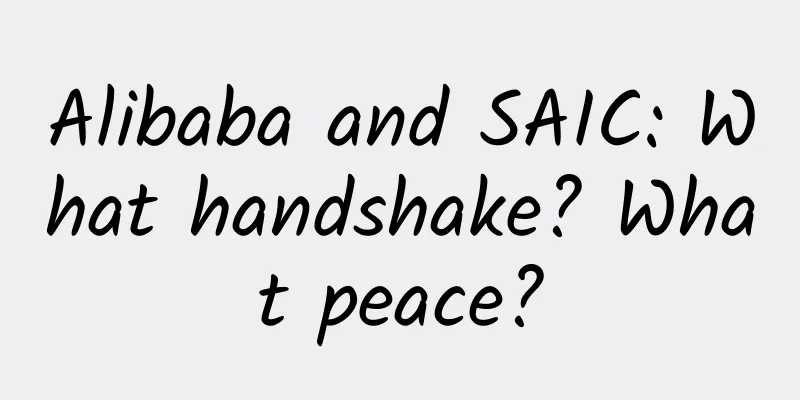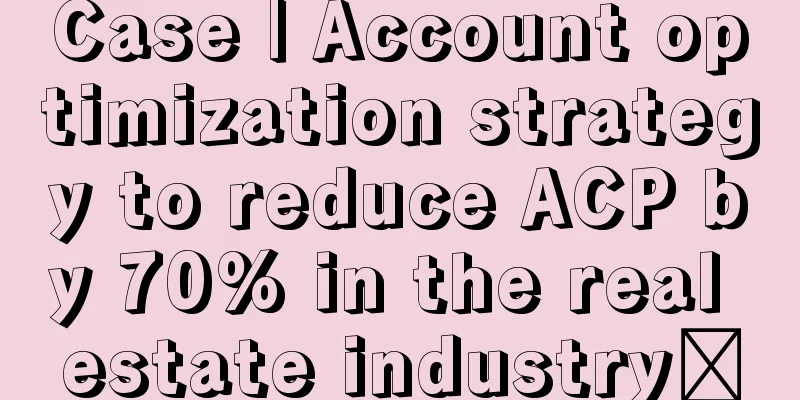Alibaba and SAIC: What handshake? What peace?

|
The recent conflict between Alibaba and the State Administration for Industry and Commerce has been quite dramatic. On January 23, the State Administration for Industry and Commerce released the "Targeted Monitoring Results of Online Transaction Goods in the Second Half of 2014", and the lowest authentic rate on Taobao was only 37.25%. For this reason, Taobao posted a Weibo, angrily accusing the officials of the General Administration of Industry and Commerce of unfair procedures and emotional law enforcement. On January 28, Taobao issued a statement, saying that Liu Hongliang, director of the Internet Monitoring Department, had improper procedures and emotional law enforcement, and decided to formally complain to the State Administration for Industry and Commerce. Just when the two sides were on the verge of a fight, there was a sudden turn of events. On January 30, Zhang Mao, director of the State Administration for Industry and Commerce, met with Jack Ma , chairman of the Alibaba Board of Directors . Both parties believed that: the regulatory authorities will further strengthen the supervision of the online market, perform their duties fairly and impartially in accordance with the law, and rely on big data and other information technologies to improve the level of supervision; e-commerce platforms will further strengthen their main responsibilities, seek innovative mechanisms, exercise self-discipline and self-improvement, and carry out business activities in accordance with laws and regulations. The media reported that "Taobao and the State Administration for Industry and Commerce have "shaken hands and made peace". US lawyers investigate AlibabaAlthough the matter has come to an end, the aftermath has not yet subsided. Alibaba's stock price has plummeted. On January 29, Pomerantz LLP, a U.S. shareholder rights law firm, announced that it was commissioned by investors to investigate Alibaba's suspected insufficient information disclosure, with the core focus on whether Alibaba and some of its executives or directors violated the provisions of the U.S. Securities Exchange Act. So far, five U.S. law firms have announced that they will investigate Alibaba's possible provision of false business information to investors. Although Alibaba is currently the most successful Chinese listed company in the United States, it still cannot get rid of the shadow of counterfeit goods. The problem of counterfeit goods has a long history in China and has caused great harm. Not only consumers are harmed, but also the social economy and the national image are damaged. The fundamental reason is that the legal awareness of all social classes in China is too confused. Take this incident as an example. Both sides shouted at each other from a distance, and both felt that they were justified. However, if we really use the legal logic to dig deeper, there are still too many loopholes. The authenticity rate is a false statementLet's first talk about the test results released by the State Administration for Industry and Commerce: "The lowest authentic rate on Taobao is only 37.25%." What is "authentic rate"? Generally speaking, we use the term "authentic rate" in two situations. One is the inspection of finished products produced by industrial enterprises. As long as the product meets the quality standards, we call it "authentic", and the defective product is called "defective". The second is for counterfeit products on the market. The real brand products are authentic. Other counterfeit products are non-authentic. The former mainly refers to the internal inspection of the manufacturer, which does not fall within the scope of national administrative inspection. If such products are sold on the market, they should be marked as "processed products". According to the current disclosure, the test results of the State Administration for Industry and Commerce should refer to the latter. If the latter is sold on the market, it is a counterfeit product, which is an obvious illegal act. It is unclear to express it only with a "authentic rate". If it is a "processed product" marked as sold, it is a legal act; if it is a counterfeit brand product, it is an illegal act. The Industrial and Commercial Bureau is a law enforcement agency. There are only two interpretations of the criteria for judging the object of its behavior: "legal" and "illegal". What is "authentic rate"? The mistakes of the SAIC and the logical errors of AlibabaFurthermore, after the conflict between the two sides intensified, the website of the State Administration for Industry and Commerce announced that Zhang Mao, director of the State Administration for Industry and Commerce, met with Alibaba Chairman Jack Ma at the State Administration for Industry and Commerce that day and affirmed the important role played by e-commerce and Alibaba. On the evening of January 30, the spokesperson of the State Administration for Industry and Commerce stated that the White Paper on the Administrative Guidance of Alibaba Group issued by the Network Monitoring Bureau is actually the minutes of the symposium, not a "white paper", and has no legal effect. Perhaps this is to relieve Alibaba from responsibility, which may be subject to judicial prosecution in the United States. But this statement is even more illogical. What is "not legally effective"? In law, "not effective" refers to illegal judgments, rulings, penalty decisions, appraisals and other acts that "have no legal effect"; another is that untrue, flawed, and illegally obtained evidence "has no legal effect". What is the White Paper on the Administrative Guidance of Alibaba Group issued by the State Administration for Industry and Commerce? It is not a penalty decision, nor is it evidence? It is a meeting record. But the meeting record records the results of the inspection! If the result is "not legally binding", then we must admit that the inspection result is wrong. Could it be that the State Administration for Industry and Commerce is playing a big joke on us? Let’s talk about Taobao’s rebuttal: First, it’s about “procedural unfairness.” What’s unfair about the inspection procedure of the Industry and Commerce Bureau? Is it just because the number of samples randomly checked from various e-commerce companies is inconsistent? This can only be said to be a question of whether the statistical figures are authoritative enough, and it cannot be said to be procedural unfairness. There are also people saying that Director Liu Hongliang of the Network Supervision Department of the State Administration for Industry and Commerce “enforces the law emotionally.” What is “enforces the law emotionally”? There is only a distinction between legal and illegal law enforcement behaviors, not “emotional” and “non-emotional,” “good emotions” and “bad emotions.” Alibaba can file a complaint through administrative judicial procedures, but it must clarify judicial concepts and logic. How can “enforce the law emotionally” be considered a reason for complaint? Funny Ali and the strange stories of the State Administration for Industry and CommerceIt should be noted that one of the reasons for Alibaba's fierce reaction is that the survey results show that its "authenticity rate" is the lowest among the several e-commerce companies that were randomly checked. As a corporate competition, this result is of course very unfavorable to Alibaba, but from a legal perspective, whether there are counterfeit goods sold is a question of the nature of whether there is an illegal act; while the number of counterfeit goods sold is a question of quantity, and the two are completely different. It is really ridiculous that the counterfeiters openly complained to the administrative unit because they thought they sold fewer counterfeit goods. Counterfeit and shoddy goods have been rampant in China for decades. In recent years, with the efforts of all parties, such as the "No Fakes in 100 Cities and 10,000 Stores" campaign, the sale of counterfeit and shoddy goods in physical shopping malls has been restrained. However, with the rise of e-commerce in recent years, counterfeit and shoddy goods have found new channels. Recently, the State Administration for Industry and Commerce conducted random inspections on e-commerce. The results showed that only 54 of the 92 batches of samples sampled by the State Administration for Industry and Commerce were genuine, with a genuine rate of 58.7% and a non-genuine rate of 41.3%. The genuine rate of online shopping goods is less than 60%, including 90% on JD.com, 85.71% on Tmall, and 80% on No. 1 Store. Taobao has the lowest genuine rate, at only 37.25%. The genuine rate of random inspections in different industries also varies, with a genuine rate of 20% for fertilizers and agricultural materials, 28.57% for mobile phones, 66.67% for clothing, 66.67% for children's toys, and 66.67% for cosmetics. It can be seen that the problem of selling counterfeit goods on e-commerce is still very serious. However, facing this severe situation, both the law enforcers and the enforced and the public opinion are extremely confused. Sometimes they want to affirm the role of e-commerce, and sometimes they want to protect the interests of enterprises. But the market economy is a rule of law economy, and all economic activities are only legal or illegal. The words "affirm the role of e-commerce" do not need to be said by the State Administration for Industry and Commerce, whose responsibility is to rectify the market order. When facing lawbreakers, there is only the question of whether to punish or not, but when facing counterfeiting and selling counterfeit goods, why should we "shake hands and talk about peace"? This is also a strange story with Chinese characteristics. As a winner of Toutiao's Qingyun Plan and Baijiahao's Bai+ Plan, the 2019 Baidu Digital Author of the Year, the Baijiahao's Most Popular Author in the Technology Field, the 2019 Sogou Technology and Culture Author, and the 2021 Baijiahao Quarterly Influential Creator, he has won many awards, including the 2013 Sohu Best Industry Media Person, the 2015 China New Media Entrepreneurship Competition Beijing Third Place, the 2015 Guangmang Experience Award, the 2015 China New Media Entrepreneurship Competition Finals Third Place, and the 2018 Baidu Dynamic Annual Powerful Celebrity. |
>>: Talking about WeChat ban again: Why do we need "net neutrality"?
Recommend
New trends in marketing and promotion in 2019!
When "What's Peppa Pig?" was all ov...
From 0 to 20 million, the 3-year growth path of Get APP
1. Get the PMF of the app PMF, or product-market ...
360 Mobile Phone N4 Enjoyable Experience: Can It Be the Best Phone Under 1,000 Yuan?
In 2016, Qihoo and Dasheng were gradually no long...
Be careful! If you see these symptoms, you must pay attention to them, or they may be signs of illness!
Reviewer of this article: Chen Sijiao, Chief Phys...
Exclusive interview with Tang Ke, CTO of Fengxing.com: Video open platform and marketing of small and medium-sized enterprises
On September 20, a salon event themed "Embra...
Can the unused electricity be stored?
This summer, Sichuan has been experiencing contin...
Collection: 68 information flow ads and SEM learning website resources are available for free!
01. CNZZ -UDplus Website: udplus.umeng.com Note: ...
Samsung GALAXY Alpha review: metal frame feels great
In previous rumors, Samsung GALAXY Alpha has alwa...
Do you have a bad face shape? Maybe you have this bad habit in the past! The earlier you treat it, the less impact it will have.
When looking in the mirror Everyone's face sh...
Why do Toutiao always know what you like to watch?
There are many apps like Toutiao and Qingmang Rea...
Gray hydrogen, blue hydrogen, green hydrogen, does hydrogen have colors?
China Science and Technology News Network, Januar...
Why do users keep churning? Teach you 3 stages of user retention methods
Product retention is similar to product onboardin...
Why do we fall asleep at night and wake up in the morning?
In temperate zones, or in low-latitude areas, in ...
Who failed in the marketing of "Squid Game"?
With the popularity of " Squid Game ", ...









